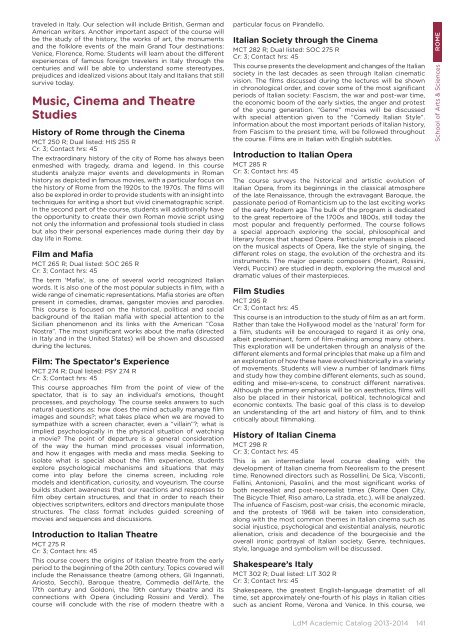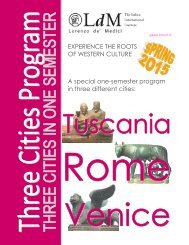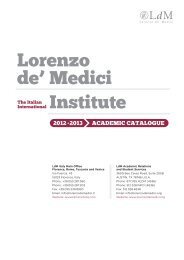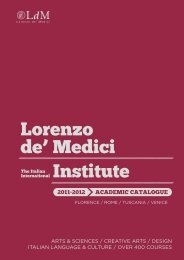aCademiC Catalog 2013-2014 - Lorenzo de Medici
aCademiC Catalog 2013-2014 - Lorenzo de Medici
aCademiC Catalog 2013-2014 - Lorenzo de Medici
Create successful ePaper yourself
Turn your PDF publications into a flip-book with our unique Google optimized e-Paper software.
traveled in Italy. Our selection will inclu<strong>de</strong> British, German and<br />
American writers. Another important aspect of the course will<br />
be the study of the history, the works of art, the monuments<br />
and the folklore events of the main Grand Tour <strong>de</strong>stinations:<br />
Venice, Florence, Rome. Stu<strong>de</strong>nts will learn about the different<br />
experiences of famous foreign travelers in Italy through the<br />
centuries and will be able to un<strong>de</strong>rstand some stereotypes,<br />
prejudices and i<strong>de</strong>alized visions about Italy and Italians that still<br />
survive today.<br />
Music, Cinema and Theatre<br />
Studies<br />
History of Rome through the Cinema<br />
MCT 250 R; Dual listed: HIS 255 R<br />
Cr: 3; Contact hrs: 45<br />
The extraordinary history of the city of Rome has always been<br />
enmeshed with tragedy, drama and legend. In this course<br />
stu<strong>de</strong>nts analyze major events and <strong>de</strong>velopments in Roman<br />
history as <strong>de</strong>picted in famous movies, with a particular focus on<br />
the history of Rome from the 1920s to the 1970s. The films will<br />
also be explored in or<strong>de</strong>r to provi<strong>de</strong> stu<strong>de</strong>nts with an insight into<br />
techniques for writing a short but vivid cinematographic script.<br />
In the second part of the course, stu<strong>de</strong>nts will additionally have<br />
the opportunity to create their own Roman movie script using<br />
not only the information and professional tools studied in class<br />
but also their personal experiences ma<strong>de</strong> during their day by<br />
day life in Rome.<br />
Film and Mafia<br />
MCT 265 R; Dual listed: SOC 265 R<br />
Cr: 3; Contact hrs: 45<br />
The term ‘Mafia’, is one of several world recognized Italian<br />
words. It is also one of the most popular subjects in film, with a<br />
wi<strong>de</strong> range of cinematic representations. Mafia stories are often<br />
present in comedies, dramas, gangster movies and parodies.<br />
This course is focused on the historical, political and social<br />
background of the Italian mafia with special attention to the<br />
Sicilian phenomenon and its links with the American “Cosa<br />
Nostra”. The most significant works about the mafia (directed<br />
in Italy and in the United States) will be shown and discussed<br />
during the lectures.<br />
Film: The Spectator’s Experience<br />
MCT 274 R; Dual listed: PSY 274 R<br />
Cr: 3; Contact hrs: 45<br />
This course approaches film from the point of view of the<br />
spectator, that is to say an individual’s emotions, thought<br />
processes, and psychology. The course seeks answers to such<br />
natural questions as: how does the mind actually manage film<br />
images and sounds?; what takes place when we are moved to<br />
sympathize with a screen character, even a “villain”?; what is<br />
implied psychologically in the physical situation of watching<br />
a movie? The point of <strong>de</strong>parture is a general consi<strong>de</strong>ration<br />
of the way the human mind processes visual information,<br />
and how it engages with media and mass media. Seeking to<br />
isolate what is special about the film experience, stu<strong>de</strong>nts<br />
explore psychological mechanisms and situations that may<br />
come into play before the cinema screen, including role<br />
mo<strong>de</strong>ls and i<strong>de</strong>ntification, curiosity, and voyeurism. The course<br />
builds stu<strong>de</strong>nt awareness that our reactions and responses to<br />
film obey certain structures, and that in or<strong>de</strong>r to reach their<br />
objectives scriptwriters, editors and directors manipulate those<br />
structures. The class format inclu<strong>de</strong>s gui<strong>de</strong>d screening of<br />
movies and sequences and discussions.<br />
Introduction to Italian Theatre<br />
MCT 275 R<br />
Cr: 3; Contact hrs: 45<br />
This course covers the origins of Italian theatre from the early<br />
period to the beginning of the 20th century. Topics covered will<br />
inclu<strong>de</strong> the Renaissance theatre (among others, Gli Ingannati,<br />
Ariosto, Secchi), Baroque theatre, Commedia <strong>de</strong>ll’Arte, the<br />
17th century and Goldoni, the 19th century theatre and its<br />
connections with Opera (including Rossini and Verdi). The<br />
course will conclu<strong>de</strong> with the rise of mo<strong>de</strong>rn theatre with a<br />
particular focus on Piran<strong>de</strong>llo.<br />
Italian Society through the Cinema<br />
MCT 282 R; Dual listed: SOC 275 R<br />
Cr: 3; Contact hrs: 45<br />
This course presents the <strong>de</strong>velopment and changes of the Italian<br />
society in the last <strong>de</strong>ca<strong>de</strong>s as seen through Italian cinematic<br />
vision. The films discussed during the lectures will be shown<br />
in chronological or<strong>de</strong>r, and cover some of the most significant<br />
periods of Italian society: Fascism, the war and post-war time,<br />
the economic boom of the early sixties, the anger and protest<br />
of the young generation. “Genre” movies will be discussed<br />
with special attention given to the “Comedy Italian Style”.<br />
Information about the most important periods of Italian history,<br />
from Fascism to the present time, will be followed throughout<br />
the course. Films are in Italian with English subtitles.<br />
Introduction to Italian Opera<br />
MCT 285 R<br />
Cr: 3; Contact hrs: 45<br />
The course surveys the historical and artistic evolution of<br />
Italian Opera, from its beginnings in the classical atmosphere<br />
of the late Renaissance, through the extravagant Baroque, the<br />
passionate period of Romanticism up to the last exciting works<br />
of the early Mo<strong>de</strong>rn age. The bulk of the program is <strong>de</strong>dicated<br />
to the great repertoire of the 1700s and 1800s, still today the<br />
most popular and frequently performed. The course follows<br />
a special approach exploring the social, philosophical and<br />
literary forces that shaped Opera. Particular emphasis is placed<br />
on the musical aspects of Opera, like the style of singing, the<br />
different roles on stage, the evolution of the orchestra and its<br />
instruments. The major operatic composers (Mozart, Rossini,<br />
Verdi, Puccini) are studied in <strong>de</strong>pth, exploring the musical and<br />
dramatic values of their masterpieces.<br />
Film Studies<br />
MCT 295 R<br />
Cr: 3; Contact hrs: 45<br />
This course is an introduction to the study of film as an art form.<br />
Rather than take the Hollywood mo<strong>de</strong>l as the ‘natural’ form for<br />
a film, stu<strong>de</strong>nts will be encouraged to regard it as only one,<br />
albeit predominant, form of film-making among many others.<br />
This exploration will be un<strong>de</strong>rtaken through an analysis of the<br />
different elements and formal principles that make up a film and<br />
an exploration of how these have evolved historically in a variety<br />
of movements. Stu<strong>de</strong>nts will view a number of landmark films<br />
and study how they combine different elements, such as sound,<br />
editing and mise-en-scene, to construct different narratives.<br />
Although the primary emphasis will be on aesthetics, films will<br />
also be placed in their historical, political, technological and<br />
economic contexts. The basic goal of this class is to <strong>de</strong>velop<br />
an un<strong>de</strong>rstanding of the art and history of film, and to think<br />
critically about filmmaking.<br />
History of Italian Cinema<br />
MCT 298 R<br />
Cr: 3; Contact hrs: 45<br />
This is an intermediate level course <strong>de</strong>aling with the<br />
<strong>de</strong>velopment of Italian cinema from Neorealism to the present<br />
time. Renowned directors such as Rossellini, De Sica, Visconti,<br />
Fellini, Antonioni, Pasolini, and the most significant works of<br />
both neorealist and post-neorealist times (Rome Open City,<br />
The Bicycle Thief, Riso amaro, La strada, etc.), will be analyzed.<br />
The infuence of Fascism, post-war crisis, the economic miracle,<br />
and the protests of 1968 will be taken into consi<strong>de</strong>ration,<br />
along with the most common themes in Italian cinema such as<br />
social injustice, psychological and existential analysis, neurotic<br />
alienation, crisis and <strong>de</strong>ca<strong>de</strong>nce of the bourgeoisie and the<br />
overall ironic portrayal of Italian society. Genre, techniques,<br />
style, language and symbolism will be discussed.<br />
Shakespeare’s Italy<br />
MCT 302 R; Dual listed: LIT 302 R<br />
Cr: 3; Contact hrs: 45<br />
Shakespeare, the greatest English-language dramatist of all<br />
time, set approximately one-fourth of his plays in Italian cities<br />
such as ancient Rome, Verona and Venice. In this course, we<br />
School of Arts & Sciences ROME<br />
LdM Aca<strong>de</strong>mic <strong>Catalog</strong> <strong>2013</strong>-<strong>2014</strong><br />
141





